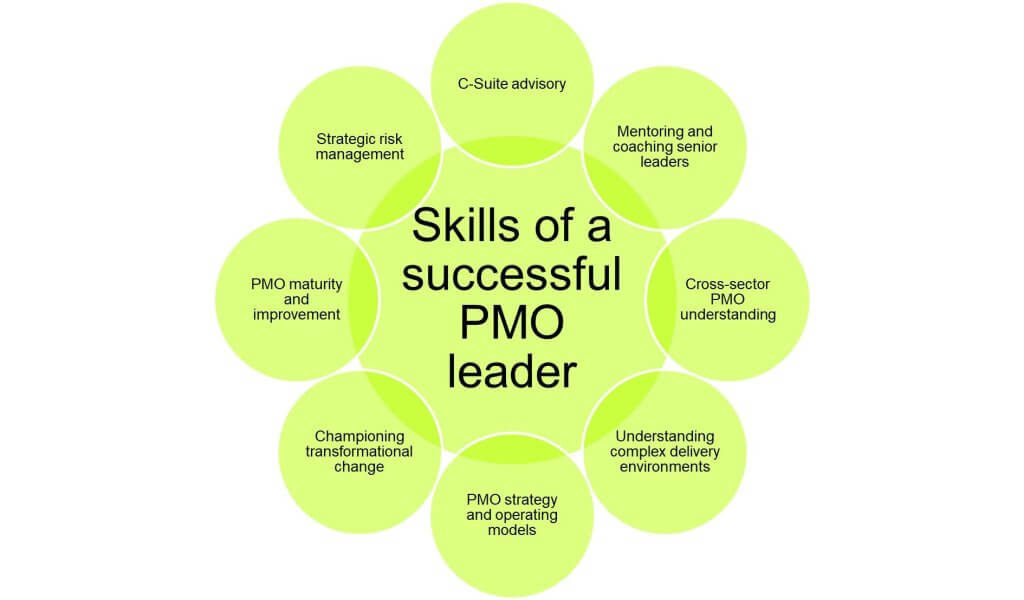What Does It Take To Be A Successful PMO Leader?

Project and Programme Management Office (PMO) leaders are key to ensuring successful project and programme delivery. Through communicating efficiently and building meaningful and supportive relationships, they positively influence a project or programme’s approach.
Many consultants working in a PMO aspire to progress into a leadership role, but the competencies of this role are not yet fully defined. So, what skills are needed to become a successful PMO leader? For those aspiring to a leadership role, we describe seven key competencies that you must possess.
1. Grow your PMO/industry subject matter expertise
PMO leaders build their credibility through experience, delivering complex programmes and projects across their career. This means that members of their team can turn to them for tips and advice on how to set up programmes and projects for success. With the application of P3M being a transferrable practice across sectors, specific industry experience doesn’t ‘pigeon-hole’ a PMO leader to one area.
2. Provide visibility and support to the team you are leading
A PMO leader delivers coaching, guidance, support and feedback that helps the people in their team to improve their skills and performance, and to achieve their full potential. They foster a collaborative and empowering environment, where open communication and self-reflection are part of the PMO’s day-to-day working.
Making time for their PMO members, as well as the wider project team, helps the PMO leader to demonstrate their visibility. By actively listening to each team member and creating a psychologically-safe space, they can fully understand the support each team member requires.
3. Create a culture of autonomy within your PMO team
Moving from a ‘management’ to a ‘leadership’ mindset is critical to a PMO leader’s success. They must grant their team members autonomy – this will support the PMO’s overall effectiveness and grow motivated and skilled team members. Having an autonomous and effective team in place enables the PMO leader to focus on the strategic impact that the PMO delivers. Micro-managing a team not only negatively impact upon team motivation, it also reduces the capacity of the leader to influence at a strategic level.
4. Communicate well, and motivate others
A PMO leader is a great influencer, able to build their personal impact. By understanding the key stakeholders they need to communicate with, as well as the needs of each stakeholder, they can negotiate solutions, support change and manage conflict. But to influence others, the PMO leader must first know themselves. Self-reflection is key to understanding how you communicate and how this affects your stakeholders. Creating the right environment, being flexible and adaptable, and always keeping in mind the purpose and desired outcome of a discussion will ensure successful communication.
5. Use your evidence base to enable adaptive decision-making
The PMO has access to masses of data, and this data delivers the performance insights needed to empower decision-making within programmes and projects. The PMO leader supports better decision-making, by ensuring all the PMO’s processes and tools are fit for purpose and are consistently adhered to. Developing and maintaining good reporting structures means that reports are accurate, and that they provide clear and timely information in an easily digestible format.
A PMO leader should be able to quickly interpret information to understand the ‘story’ or the ‘so what’ of an issue. This helps them to provide a layer of assurance, demonstrate their grip of the overarching strategy, and highlight the right issues at the right time.
6. Grow your experience and skills in reporting and governance
Governance structures determine what will be reported and when, who receives the information, and how it will be presented. A strong PMO leader influences the governance stack of a project or programme – tailoring reporting and governance arrangements to ensure they are proportionate based on the project or programme’s size and complexity.
By establishing the strategic requirements, key performance indicators (KPIs) and available data sources, the PMO leader provides effective visualisation that allows stakeholders to truly understand what is happening across the whole programme. And by linking data together to tell a cohesive story, they present clear recommendations to underpin decision-making.
- Build trust at the strategic level
Anyone working in the PMO should be a trusted advisor, but the PMO leader should be a trusted advisor to C-Suite stakeholders, not just to their immediate project or programme manager. By seeing the bigger picture outside the project or programme they are working on, the PMO leader demonstrates their credibility to senior leadership. Their insights can add value to organisational strategy and performance, and they can influence business direction at a senior level.
The requests of C-Suite stakeholders differ to those of day-to-day stakeholders, so understanding their needs and communication preferences is an important part of preparing to engage. Recognising that the C-Suite is ‘time-poor’, the PMO leader knows to present a succinct view that gets straight to the heart of the matter.

Fig 1 – required skills for an effective PMO leader
Developing leaders
So, how can organisations help these future PMO leaders to build these competencies and grow their skills and careers? Within AtkinsRéalis we have a specific PMO practice who deliver services and solutions to our clients, so developing our PMO leaders is very important to us. One of the ways in which we develop our consultants and clients who aspire to take on a leadership role is through a focused PMO leadership development programme.
Within our programme, for example, we develop future leaders through providing subject matter expert-led masterclasses and facilitated workshops. The masterclasses feature a mix of softer and more technical skills: from leadership styles, influencing and developing high-performing teams; to how the PMO fully integrates into its system environment, and the value of the digital PMO. Future leaders can be further supported with their next steps through one-to-one career planning.
But leadership in the PMO is about behaviour, not grade or rank. By developing the competencies outlined above, and shifting your mindset to that of a leader rather than a manager, you can build an exciting career.
Michael Huntley is a Principal Consultant at AtkinsRéalis.




